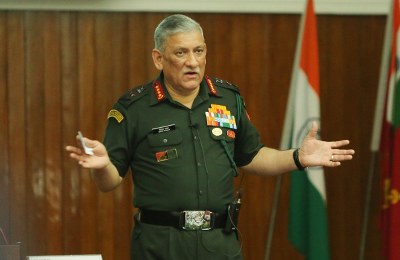Arunachal incident resolved: Army Chief

Army Chief General Bipin Rawat (File Photo)
Updated : Jan 08, 2017, 20:02 IST, First Published : Jan 08, 2017, 15:12 IST
New Delhi, Jan 8 : Indian Army Chief General Bipin Rawat on Monday said there has been a major reduction of Chinese troops in Doklam.
India and Chinese armies were locked in a 73-day stand-off at Doklam in the Sikkim section of their border.

The crisis was resolved in August last year after both sides retreated from the point of the face-off.
But the Chinese beefed their presence in the plateau claimed by Thimpu and Beijing.
Speaking on the sidelines of an event here, the Army Chief also said the transgression incident in Arunachal Pradesh, where Chinese workers entered Indian territory constructing a track, had been resolved.
“Tuting incident has been resolved,” Rawat said. Gen Rawat said a Border Personnel Meeting (BPM) took place two days back on the issue.
A Chinese road construction party entered India on December 26 and was constructing a track, around two kilometres away from the nearest Indo-Tibetan Border Police post.
An almost 600-metre-long and 12-feet wide track was built on the Indian territory when the Chinese party was stopped.
The Chinese labourers had entered the area inadvertently, according to a government report on the incident. The Chinese People’s Liberation Army (PLA) troops were not involved in the incident.
Indian troops pushed back the labourers and seized their equipment.
The incident came nearly four months after the end of the Dokalam stand-off that went on from June 16 to August 28, 2017.
Earlier, speaking at the Army Technology Summit here, the Army Chief pitched for modernisation of the force and said India needed to be ready for “future wars”.
“There is a huge requirement of modernisation of our armed forces, in every field,” he said.
“Future wars will be fought in difficult terrains and circumstances and we have to be prepared for them.
“We would like to gradually move away from imports (in defence technology) because for a nation like ours the time has come to ensure that we fight the next war with home-made solutions,” he said.
IANS




